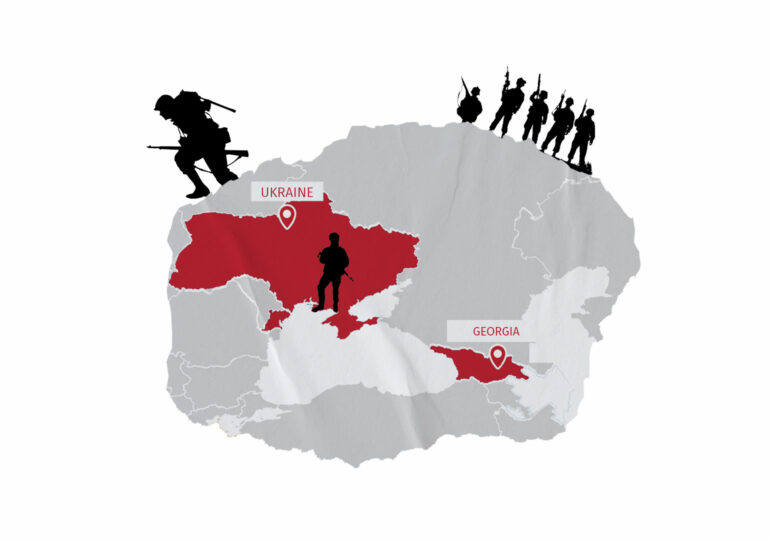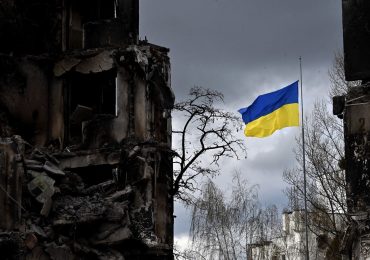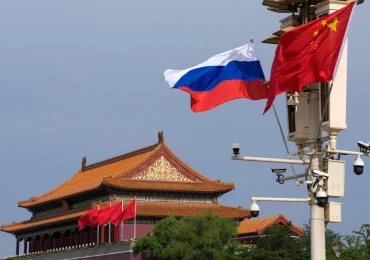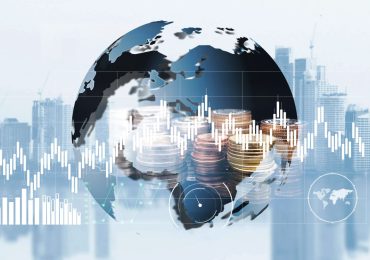The time has come when projections are so time-sensitive that it is hard to catch lasting trends. The reason for this is an unimaginable reality that all of us must face due to a fully-fledged war in the 21st century, which should have been the century of diplomacy rather than armed conflict. But Putin and his Russia have made it clear that imperialism has neither a sense of humanity nor respect for others’ liberty.
In the fall of 2021, Ukrainian officials reported that the Russian government placed 100,000 troops near their border with Ukraine. On February 21st, 2022, Russian President Vladimir Putin announced that Russia recognized the independence of the separatist Donetsk (DPR) and Luhansk (LPR) People’s Republics. Three days later, Putin launched a military attack on Ukraine stating that it was to protect residents of the Donbas region from the Ukrainian government. Since then, Russian forces have been attacking major cities and infrastructure in Ukraine.
The Office of the United Nations High Commissioner for Human Rights (OHCHR) has verified a total of 564 civilian deaths, including 41 children, during Russia’s military attack on Ukraine as of March 10th, 2022. 982 people were reported to have been wounded. However, the OHCHR specified that the real numbers could be much higher.
After Russia started its ‘official’ invasion of Ukraine on February 24th, 2022, more than two million refugees left their homes in Ukraine and headed toward Western countries. Most of them fled to Poland. Today, besides being involved in the actual fighting, you can find a number of Georgian volunteers working on the Poland border with Ukraine assisting those crossing the border in search of safety.
According to Statista, which has compiled several reports on public opinion of Ukrainians toward Russia in 2021-2022, the share of Ukrainians with a positive opinion of Russia amounted to 39% in November 2021 – 2% lower than in February of the same year; while the share of respondents with a negative attitude toward the neighbouring country increased by 7% when compared to February 2021.
The same source says that in February 2022, slightly over one-half of respondents in Russia had a negative attitude towards Ukraine. Public opinion of the country deteriorated in comparison to August 2021. Public opinion also worsened in 2014 when the tension between the two countries intensified and Russia then annexed Crimea and Sevastopol from Ukraine.
It should be noted here that although most Russians feared a war with Ukraine – 51% prior to the war – only 32% were worried that the West would impose sanctions.
After, on February 21st, 2022, Russian President Vladimir Putin recognized separatists in Donetsk and Luhansk as independent and ordered Russian troops into the region. The very next day, the US and its allies responded with the first of what would become thousands of sanctions. To this day, Russia is the number one sanctioned country in the world.
Renaissance Capital Holdings Limited, a leading emerging and frontier markets investment bank providing access to over fifty markets across the globe, definitely did not see this coming when we talked in late February in a Zoom interview from Moscow to Tbilisi for The Checkpoints. “Military invasion was not what Russia was targeting from the very start,” said Sofya Donets, Director of Renaissance Capital. She added that Russia believed that tough sanctions were not likely.
In our conversation that lasted an hour, Renaissance Capital totally ruled out Russia’s disconnection from SWIFT and any sanctions on banks or corporates of the country. “Russia is very well prepared.” Stated Sofya Donets basing her argument on the Russian reserves of $630 billion and Russia’s ability to fully cover its total external debt. She completely refuted the idea of any type of sanctions targeting Russia’s oil and gas industry given that it would be costly for both sides – meaning Russia and the West.
What we see today is a completely different picture: The US banned all imports of Russian oil and gas with President Biden stating it is targeting “the main artery of Russia’s economy,” and the UK said it would phase out Russian oil by the end of 2022. The EU, which gets a quarter of its oil and 40% of its gas from Russia, said it would switch to alternative supplies and make Europe independent from Russian energy “well before 2030.” Germany has temporarily suspended the Russian Nord Stream 2 gas pipeline from opening.
More so, Western countries have frozen the assets of Russia’s central bank, to stop it from using its $630 billion of reserves, suspended Russia from the Bank for International Settlements – “the central bank of central banks” – to stop it from using its services. The US, EU and UK have banned people and businesses from dealing with the country. Some Russian banks are being removed from the international financial messaging system SWIFT, which is used to transfer money across borders, targeting to delay Russia being paid for energy exports.
The West definitely stands united in sanctioning Russia for its invasion of Ukraine.
Now, of course, it is childish to think that Putin’s war in Ukraine – which is in Georgia’s region – will not affect our country. We can think of at least three directions where the impact might be significant.
First, Russia and Ukraine are important trading partners for Georgia. The contributions of these economies are mainly in terms of trade, tourism and remittances, the decline of which clearly means lost revenue for Georgia.
Second, Georgia experienced the August War in 2008 and its creeping occupation is still ongoing, drawing Russian military forces closer and closer to Tbilisi each day. On top of this, Putin’s current imperialistic narrative systematically includes Georgia. All this, of course, does not contribute to a positive business and investment climate in our country. On the contrary, it does the opposite.
Finally, Georgia is a small and open economy. This means that if the global economy suffers, this will have a negative spillover effect on Georgia’s economy as well. The pandemic has already shown us how significant that impact might be.
It clearly makes no sense to talk of specific dynamics at this point because uncertainty is so high, even projections coming from Georgia’s leading investment banks – TBC Capital and Galt & Taggart – are constantly changing and adapting to the new developments in Ukraine.
What is totally clear is that the only thing that could end this uncertainty is Ukraine winning the war.
“The way the war in Ukraine ends will determine the future of Georgia to a very large extent,” Giorgi Papava, chief economist at ISET told me recently elaborating on the major impact of this devastating war on Georgia. “Can you imagine a country that can be attacked at any time? What kind of development can that country achieve?”
Indeed, take a minute to think about what the West gains if Ukraine loses. It gets an aggressor who would then dictate its own reality and conquer everyone in that reality.
Being silent and doing nothing is not an option.
“We have all seen what the aggressor neighbour is made of,” Papava says, adding that no well-being for Georgians, no economic development for the country is projected if it’s dependent on Russia “because Russia does not value lives.”
As of 2021, Russia amounted to 6.7% of Georgian GDP, up from 5.7% in 2020.
Today, when Europe is working hard to diversify its economy from Russia, it makes even more sense for Georgia to do the same.
Not long ago, The Hill featured an interesting piece by Brock Bierman, an opinion contributor to this edition and a visiting fellow for Democracy Initiatives at the German Marshall Fund of the United States who prior to that, served as the assistant administrator for USAID’s Bureau for Europe and Eurasia, including Georgia specifically. “Give Georgia a Free Trade Agreement” was the headline of his article. On his brief visit to Tbilisi, I got the chance to talk to him and one interesting message coming from him is that besides the great value of the FTA with the US both economically and politically for Georgia, this could also be one factor that decreases polarization in our country.
“There hasn’t been a single person that I have talked to from all of the political parties and from all of civil society that hasn’t said that the FTA is something they all agree will have a huge impact here in Georgia and that it will have not just a positive impact on the economy but also positively impacts relationships; it will be a morale-builder, a good-will message from a country that has had a strong relationship with Georgia over the last thirty years.” Brock Bierman explained.
More so that the green light given to Ukraine recently on its journey toward EU membership candidacy is also an opportunity for Georgia. The risks associated with Georgia are nothing compared to those that the EU is willing – very rightfully so – to consider in the case of Ukraine.
And yes, we might bear the cost of being crystal clear on where we stand today, but that will be the price we pay for our freedom and economic prosperity tomorrow.
So, without any hesitation: Long live free Georgia! Слава України!

















